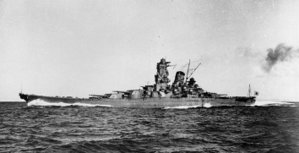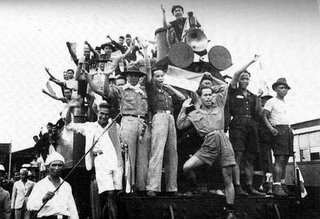You Just Can't Be Everyone's Hero!
Saturday, November 26, 2005 by Mariskova
 TV Stations lately have been showing commercials about the running of Yamato movie. Yamato is a Japanese battleship in 19451 which was one of the largest ships ever built. It was also designed to be superior to any ship the US was likely to produce. This movie particularly tells about the lives of the Yamato soldiers. Historically speaking, the ship was destroyed by the American planes less than halfway from mainland Japan to Okinawa on April 7, 1945. Over 400 thousands officers died and only 269 men survived.
TV Stations lately have been showing commercials about the running of Yamato movie. Yamato is a Japanese battleship in 19451 which was one of the largest ships ever built. It was also designed to be superior to any ship the US was likely to produce. This movie particularly tells about the lives of the Yamato soldiers. Historically speaking, the ship was destroyed by the American planes less than halfway from mainland Japan to Okinawa on April 7, 1945. Over 400 thousands officers died and only 269 men survived.It is supposed to be a good -or even a great- movie. Rich in details, good story, collosal and 'spiritual'. It's a movie about heroes, after all. However, unfortunately, not everyone is happy with the movie, with the history haunting it. You see, for the Japanese, the ship symbolizes greatness, heroism (even when it sunk), self-sacrifices for the country because the ship and the men were believed to fight for the country, to protect the country. There's nothing wrong with that point view, only that the rest of the world population don't agree with it! The ship that is believed had 'protected' the country is also the same ship that had helped 'colonize' other people's beloved countries so more and more people from other countries reject the movie. They didn't allow one surviving officer to publish his story about the ship, let alone making the movie! A hero for some people may not be a hero for others.
Another example of the fuss about heroes is about Prime Minister Junichiro Koizumi's visit to Yasukuni Shrine last month. Yasukuni shrine was build to commemorate and worship those who have died in war for their country (read: Japan) and sacrificed their lives to help build the fundament for a peaceful Japan (the meaning of Yasukuni is "peaceful country"). You may ask what's the big fuss about this shrine? Every country has its monument for its heroes, doesn't it? The problem is (and believe me it's a BIG one), the shrine also buried Japanese soldiers who were killed in the war, including those convinced as war criminals! The visits to this shrine then becomes controversial. The Prime Minister received LOUD protests from China and Korea, mostly. (I wonder why Indonesia didn't?!)
The government claims the Prime Minister believes the peace and prosperity that Japan enjoys today has been built upon the valuable sacrifices of those who perished in that war, and so it is important to show appreciation for their sacrifice. In other words, he claims his visit is not to whitewash Japanese militerism in past; only to appreciate the heroes. Well, what do you expect Mr. Prime Minister? The people you appreciate were rapists, murderers, and looters in other countries... (believe me this belief is not mine alone).
Why am I -also- making a fuss about this topic? Well, these two things have been making headlines for sometime here, for one, and second, I just can't get them out of my head. My logical part of the brain (and yes, I have a brain) says it's the Japanese's business, not Indonesians' Chinese's, Korean's, Americans', or others' if these people want to pray for their heroes. I think that people should be given freedom to choose their own heroes. But, when I really think hard about it, I'm not sure I will let anyone worship people I consider evil, in peace!? Will you? It is surprising for me that while half of me is indifferent with this subject, another half is totally emotional.
 Uff, what a tough business here. Nowadays, making someone a hero is not so simple. The qualifications are open for debate. You can't directly become a hero because you have eliminated an enemy, because, who defines enemy? Who defines a hero?
Uff, what a tough business here. Nowadays, making someone a hero is not so simple. The qualifications are open for debate. You can't directly become a hero because you have eliminated an enemy, because, who defines enemy? Who defines a hero?Indonesian soldiers (and heroes for the people) were named 'extremists' by the Dutch (God only knows what other names Indonesian soldiers were given in the past since the country has more than enough history of colonization). The pilots who dropped the atomic bombs to Hiroshima and Nagasaki were considered heros for the allies, while they were evils in Japan. Robin Hood was not only a hero, but also a thief. Rahwana is considered a hero for some because he believes in Sinta's purity even though others think he is just a plain kidnapper. Rama, on the other hand, is not much of a good man since he lets Sinta die (May he be burnt in hell! Burning his wife like that while he himself is guilty of being unable to protect her! It doesn't matter how handsome people say he is, he's still guilty of domestic violence!).
What?
Yes, Rama, this is personal!

Am I making this thing bigger than it should be? Na-ah! Let me just make it small so it will become like this: In a simple daily thought when I say I just can't be everyone's hero, it also means I just can't satisfy everyone! I (and You) can't be everyone's angel, everyone's favorite. I (and You still) can't have all the rights or/and all the wrongs. Careful, when you're called a hero by some, look around you. May be you just hurt some others.
And then what? Umm... I really don't have a conclusion. I'm just trying to get rid of the nagging feeling inside, after all. But, perhaps, I can give a little advice. If you are convinced that you also find it impossible to become everyone's hero, at least, be one for those who matter to you most in your life.
pictures: google images & corbis







